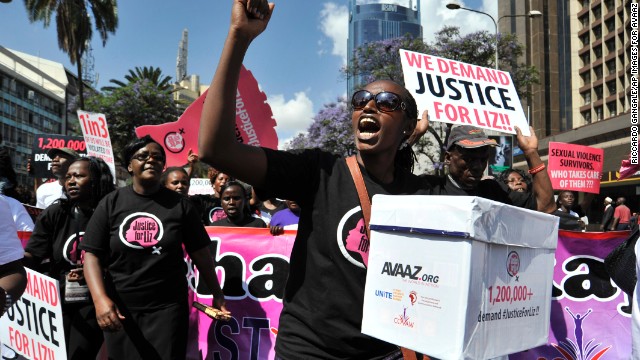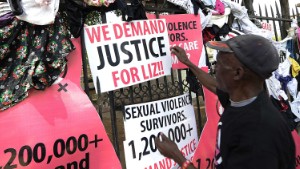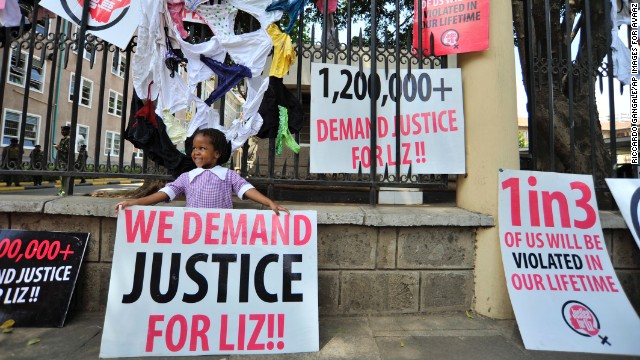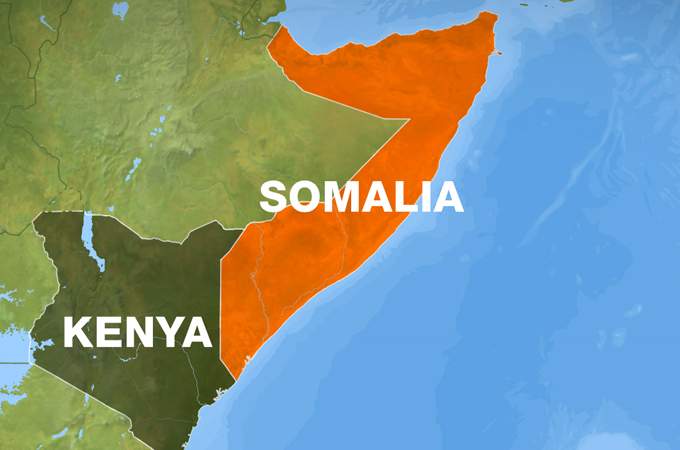| No where to hide Tanzania’s stolen mineral wealth, |
 |
 |
Corrupt officials and mining companies have no where in the US to
hide their corrupt and ill gotten mineral wealth as a new key
legislation takes effect
Tanzania’s mining laws which keep whatever goes on in the industry so
secret to the extent of depriving its own citizens of such vital
information may sooner than later become obsolete as a new US
legislation comes into effect.
This follows legal development that took place recently, and what is
more interesting, completely outside Tanzania’s sphere of influence! The
key US law takes the lid off secrecy in Tanzania’s mining sector
Before the emergence of the legal development, Tanzania’s 2010
Mining Act, Section 25, criminalized (and unfortunately, continues to)
disclosure to the general public of any information obtained from mining
companies.
The implication of this is that whatever knowledge Tanzanians have on
minerals mined in their country is solely dependent on what they are
told by their government and with all the attendant problem of lack of
verification.
And because of this, they (Tanzanians) don’t know
adequately, for instance, how many tons of gold are mined by foreign
mining companies.
Since they don’t how many tons of gold are mined, say per annum, it
goes without saying that they don’t know adequately how much their
country earns, through taxes/loyalty, from such companies!
And
because the people are starved of such vital information pertaining to
their own mining industry which is supposed to be a major contributor to
their country’s economy, they are not in a position to challenge their
own government!
However, as already noted, this problem will now become history. The
good news that is set to completely change the way things have been
going on in Tanzania’s mining industry took place in July this year
(2010) when the US President, Barrack Obama signed the Dodd-Frank Wall
Street Reform and Consumer Protection Act.
Under the act, all energy and mining companies registered with the US
Stock Exchanges are required to disclose not only what they pay to the
US government, but also to foreign oil, gas and mineral producing
countries like Tanzania.
Therefore only foreign mining companies in Tanzania that are not
registered with the US Stock Exchange will be able to continue to cheat
both Tanzanians and their own government.
What this means is that
from now onwards, Tanzanians, through their media, individual and
collective efforts, would be able to know exactly how much tons, say of
gold, was mined in a given year.
Such information would, in the long run, help them in knowing how much money their country earned from mineral proceeds.
The introduction of the US legislation is a major fillip for
Tanzanians, as far as the country’s mining industry is concerned since
most of the foreign mining companies in Tanzania have links in the US,
hence their registration in that country’s Stock Exchange is more or
less assured.
Lack of transparency in laws governing Tanzania’s
mining industry has been in existence for a very long time despite being
repeatedly criticized by local and international civil societies.
For instance, even an old mining law under Section 21, criminalizes
the disclosure of information obtained from a mining licensed holder.
The
new US law which came into force in July this year (2010), can rightly
be described as having rescued African governments, as far as misuse of
money accruing from mining industry is concerned, in two ways:
One, from now onwards, it would not be easy for foreign mining
companies that are registered with US Stock Exchanges to cheat both the
people and governments where they operate from when it comes to how many
tons, say of gold, they have produced per annum.
As long as such figures become available through the US Stock
Exchange, it would be quite easy for countries like Tanzania to work out
how much money was earned in taxes/loyalties.
Secondly, knowledge on
the part of say Tanzanian government that such important mining figures
and earnings are no longer secret, would force it to become more
transparent in its dealings with the country’s lucrative mining
industry.
For instance, it is very disturbing to note that although Tanzania is
presently the second leading gold mining country in Africa the
expensive minerals have, not in any way, helped in extricating the
country from its present telling poverty.
And the main reason behind this is very simply, the crafting of poor
mining policies/laws which so much benefit foreign mining companies that
the country is left with nothing but gaping holes to the detriment of
its environment.
It is therefore no wonder that one of the country’s most respected
retired appellate court judges, Mr Lameck Mfalila, recently described
such mining laws as the most badly crafted laws that had ever graced the
land.
The retired judge made the comments when he was launching the
Non-State Actors Charter on the Tanzania We Want Before and After the
General Elections at the Blue Pearl Hotel, Ubungo Plaza, on the
outskirts of Dar es Salaam on September 20th this year (2010).
Explaining the seriousness of Tanzania’s mining policy/laws, the
retired judge said last year (2009), one of the foreign mining companies
in Tanzania (there are presently five major gold mines) produced tons
of gold at a time when one ounce of gold at the world market was selling
at 2420 British sterling pounds.
Apart from challenging the audience to tell him how much the foreign
mining company earned from its large volumes of tons of gold, the
retired judge said even if Tanzania had demanded from foreign mining
gold companies one kilogramme of gold from every 100 kilogrammes, the
country would have been well off from its gold proceeds.
“The Bank of Tanzania, BoT, could have collected the kilos from
foreign mining companies, deposited it in foreign banks where it could
have served us as collateral for loans which could have helped us in
financing our economy,” he said.
He gave the example of the former Deputy Prime Minister, Mr Augustine
Lyatonga Mrema who had, during his short tenure, ordered the BoT to buy
gold from small scale miners in order to stop the sale of the precious
metals to neighboring countries.
“In just one year, the BoT was able to collect 16 tons of gold which
it proceeded to deposit with one Swiss bank…One international financial
institution became worried that if Tanzania was allowed to continue with
what it was doing, it would sooner than later become economically
strong and independent…the international financial institutions did not
want that to happen! As expected, they flexed their muscles, questioning
the Tanzanian government why it was involving itself in business.
Unfortunately, we bowed to their pressure and that was that,” he said
visibly disappointed.
Political observers strongly believe that the kind of mining
policies/laws currently in existence in Tanzania are inclined towards
secrecy and perpetuate loopholes for corruption. The secrecy that
sorounds the mining laws also provides grounds for suscipcion that those
who crafted such laws did so after being paid or being promised kick
backs by foreign mining companies.
Tanzania’s mining laws are such that it is extremely difficult to
undo them! The fourth phase administration of President Jakaya Kikwete
tried to undo them but failed.
However, the good news is that all five gold mines represent just four percent of Tanzania’s potential gold deposits.
The implication of this is that the government could leave the
present mining laws to catter for the five gold mines and come up with
new laws that would control the remaining 96 percent of the country’s
gold deposits along with other mines.
Apparently the foregoing scenario is well known by the present
government. But the million dollar question is why is it not acting
having failed to deal with the already existing mining laws?
The
existence of the new US law was first made public to 23 African Heads of
States during the African Union conference held at Munyonyo, in Uganda
mid this year (2010).
Announcement of the new law was made to the august AU conference by President Barrack Obama’s Secretary General, Eric Holder.
Mr Holder said his country had finally decided to stop ‘safe haven’ for corrupt politicians’ dirt money.
The
warning that US will not provide safe haven to money stolen from Africa
is a clear statement that US is now ready and will work hand in hand
with African institutions that are entrusted with the difficult task of
curbing corruption and money laundering.
In a statement that appears to be aimed at somewhat assuring Africa,
Mr Holder said his government will not only act within, but also
without, across its borders.
He said: “Washington would seize money stolen by corrupt leaders and hidden in America and the West.”
Holder said: “…the efforts would target large-scale corruption
perpetrated by foreign nationals……I have assembled a team of prosecutors
(to deal exclusively with this)”.
He said his government also
willing to support development of African judiciaries so that it can
deal with what he described as corruption monsters.
The fact that US will act beyond its borders brings light what has
been going on in Tanzania where some of its leaders are known to have
stashed ill-gotten money in offshore accounts.





























 Tanzanite
was discovered around 1967 in Tanzania, near Arusha. According to
legend, tanzanite was discovered when a Masai tribesman found the
sparkling stones in the remnants of a lightning fire, which had
evidently heated the brown stones to a vivid blue. This led to the
realization that heating zoisite--an opaque, usually brownish
mineral--turns it beautifully transparent and blue.
Tanzanite
was discovered around 1967 in Tanzania, near Arusha. According to
legend, tanzanite was discovered when a Masai tribesman found the
sparkling stones in the remnants of a lightning fire, which had
evidently heated the brown stones to a vivid blue. This led to the
realization that heating zoisite--an opaque, usually brownish
mineral--turns it beautifully transparent and blue.

 Kenyans marched through Nairobi on
Thursday, October 31, to demand justice for a teen who was allegedly
gang-raped, and the suspects ordered to cut grass as punishment.
Kenyans marched through Nairobi on
Thursday, October 31, to demand justice for a teen who was allegedly
gang-raped, and the suspects ordered to cut grass as punishment.




